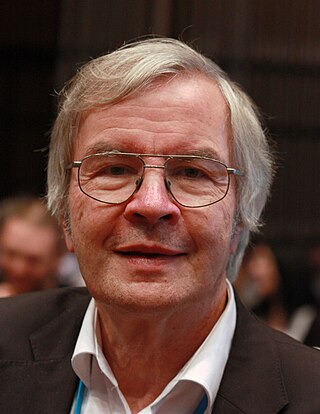Martin Beneke | |
|---|---|
| Born | 1966 (age 57–58) |
| Nationality | German |
| Alma mater | University of Konstanz University of Cambridge University of Heidelberg |
| Scientific career | |
| Fields | Physics |
| Institutions | RWTH Aachen Technical University of Munich |
Martin Beneke (born 1966) is a German physicist.
Beneke studied Physics, Mathematics and Philosophy at the University of Konstanz, University of Cambridge and University of Heidelberg. In 1993 he received his doctorate at the Technical University of Munich on the structure of perturbative series in higher order and habilitated in Heidelberg in 1998.
At the age of 33 Beneke became head of the Chair of Theoretical Physics (Department E) at the RWTH Aachen University in 1999. In 2008 Martin Beneke was awarded the Leibniz Prize in the amount of 2.5 Million Euro. The research done by Beneke considerably contributes to the verification of theoretical concepts of elementary particle physics, to the indication of variations and to the identification of new structures.

Arnold Johannes Wilhelm Sommerfeld, was a German theoretical physicist who pioneered developments in atomic and quantum physics, and also educated and mentored many students for the new era of theoretical physics. He served as doctoral supervisor and postdoc supervisor to seven Nobel Prize winners and supervised at least 30 other famous physicists and chemists. Only J. J. Thomson's record of mentorship offers a comparable list of high-achieving students.

Leibniz University Hannover, also known as the University of Hannover, is a public research university located in Hanover, Germany. Founded on 2 May 1831 as Higher Vocational School, the university has undergone six periods of renaming, its most recent in 2006.

Theodor Wolfgang Hänsch is a German physicist. He received one-third of the 2005 Nobel Prize in Physics for "contributions to the development of laser-based precision spectroscopy, including the optical frequency comb technique", sharing the prize with John L. Hall and Roy J. Glauber.

The Gottfried Wilhelm Leibniz Prize, or Leibniz Prize, is awarded by the German Research Foundation to "exceptional scientists and academics for their outstanding achievements in the field of research". Since 1986, up to ten prizes have been awarded annually to individuals or research groups working at a research institution in Germany or at a German research institution abroad. It is considered the most important research award in Germany.
Norbert Peters was a professor at RWTH Aachen University, Germany and one of the world-wide authorities in the field of combustion engineering. He headed the Institut für Technische Verbrennung (Institute for Combustion Technology). Born in Linz, Austria, he was educated at the Karlsruhe University of Technology and later at the Technical University of Berlin. He worked in Rourkela Steel Plant for six months.
Peter Wasserscheid is a German chemist and professor for chemical reaction engineering at the University of Erlangen-Nuremberg. Together with Matthias Beller he won the Gottfried Wilhelm Leibniz Prize in 2006.

The Otto Hahn Medal is awarded by the Max Planck Society to young scientists and researchers in both the natural and social sciences. The award takes its name from the German chemist and Nobel Prize laureate Otto Hahn, who served as the first president of the Max Planck Society from 1948 to 1960.
Walter Selke is a German retired professor for Theoretical Physics at the RWTH Aachen.
Theo Geisel is a German physicist. Geisel is a director at the Max Planck Institute for Dynamics and Self-Organization and professor of theoretical physics at the University of Göttingen. His research is primarily concerned with the behavior of complex systems ranging from theoretical investigations in quantum chaos to nonlinear phenomena occurring in the brain.
Karl Leo is a German physicist.
Wolfgang Krätschmer is a German physicist.

Laurens W. Molenkamp is a professor of physics and Chair of Experimental Physics at the University of Würzburg. He is known for his work on semiconductor structures and topological insulators.
Leif Kobbelt is a German university professor for Computer Science with a specialization in Computer Graphics. Since 2001 he is the head of the Institute for Computer Graphics and Multimedia at RWTH Aachen university.
Rainer Waser is a German professor of Electrical Engineering at RWTH Aachen University. He is also director of the section Electronic Materials at the Peter Grünberg Institute which is located on the campus of Jülich Research Center. His research and teaching is on solid-state chemistry and defect chemistry to electronic properties and modelling, the technology of new materials and the physical properties of construction components.
Wilhelm Carl Gottlieb Müller was a German physicist, mathematician, and philosopher. He is best known as the successor of Arnold Sommerfeld as Professor of Theoretical Physics at the University of Munich.
Ilme Schlichting is a German biophysicist.
Sigfried Bethke is a German physicist and science manager.
Britta Nestler is a German materials scientist at the Karlsruhe Institute of Technology. Her research involves the development of software to simulate the formation of microstructures in advanced materials for which experimental studies would be too expensive or difficult.

The TUM School of Natural Sciences (NAT) is a school of the Technical University of Munich, established in 2022 by the merger of various former departments. As of 2022, it is structured into the Department of Biosciences, the Department of Chemistry, and the Department of Physics. The school is located at the Garching campus.